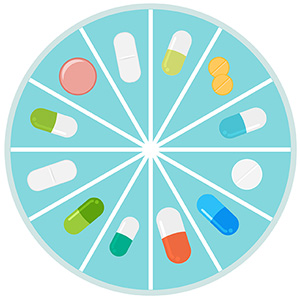By Ryan Waterfield
Baby Boomers are a powerful demographic group
About 76 million people were born during the baby boom years—1946-1964. As more Baby Boomers are leaving the work force and enrolling in Medicare for their insurance needs; healthcare providers are focusing on the most common health concerns this generation is facing. Here’s the lowdown:
Certainly, the risk of chronic illness increases with age, but there are behavioral factors that can mitigate many of these issues. A healthy diet, physical activity, and avoiding tobacco use are three key factors in reducing the risk of chronic diseases associated with aging.
Many of these illnesses require a plethora of medications. Simplefill’s Prescription Assistance programs can help you get the right medications for the right price. There’s no need to overspend on your medications. Simplefill will make the process easy, advocate on your behalf, and give you peace of mind.
The more aware you are of the potential health risks that you face as you age (and their potential costs), the more proactive you can be about preventative care and seeking medical attention when you show signs or symptoms. So, here’s to knowing what might ail you.
1.TYPE 2 DIABETES: In a 2011 study by Centers for Disease Control (CDC) showed that people ages 65-74 were diagnosed with Type 2 Diabetes 13 times more often than people 45 years or younger. Because Diabetes increases the risk of other serious health problems, it is of significant concern. Other problems include: high blood pressure, vision loss, nerve damage, foot problems, kidney disease, and cardiovascular disease.
2. HEART DISEASE: is the leading cause of death for both men and women over the age of 60. Coronary artery disease (when the arteries that deliver the blood to the heart are narrowed or blocked) is the most common type of heart disease. How do you avoid heart disease? Avoid tobacco, control your blood pressure and cholesterol, exercise and eat a low-fat, low-sodium diet. Maintaining a healthy body weight is also important.
3. CANCER: Once you hit a certain age, it seems like some type of cancer is affecting someone you know or love. And no wonder, it is the second-leading cause of death for people over 65. Cancer screenings and early detection can save lives so don’t avoid tests like colonoscopies and mammograms.
4.DEPRESSION: More than 6.5 million Americans 65 or over are affected by depression. While depression is not a typical process of aging, there are many realities about getting older that can lead to depression: changes in work status, changes in family dynamics, health concerns/struggles etc. It is important to know that it is not a sign of weakness to seek help for depression and baby boomers are a generation less likely to admit to feeling depressed than many of the generations that follow. If you are feeling down, lethargic, sad, talk to your doctors, they can help you get the treatments you need.
5.ALZHEIMER’S DISEASE: The sixth-leading cause of death in the U.S., Alzheimer’s is most common in people over 65, but people can experience symptoms in their 40s or 50s. Recent studies have shown that there is a connection between the general health of the heart and blood vessels and the health of the brain. Avoid tobacco, eat a healthy diet, and stay physically active.
6.ARTHRITIS & JOINT PAIN: Much of the joint pain that people over 60 experience is due to the breakdown of cartilage in the joints. When the cartilage breaks down, bones rub on bones and that causes swelling, pain, and stiffness called osteoarthritis. Maintaining a healthy weight decreases the stress on joints and physical actively like walking, yoga, swimming can keep joints flexible.
7. CAREGIVER STRESS: As partners take ill with chronic diseases like cancer, Alzheimer’s, and other diseases, the spouse becomes the caretaker. Baby Boomers are also sometimes caring for their aging parents and can be susceptible to caregiver stress in that relationship. Being a caregiver will often redefine the roles in a marriage or long-time family relationship. Those suffering from chronic and incurable illnesses will see a significant change in quality of life that is recognized and often treated as part of the overall medical treatment plan for the illness; but the quality of life of caregivers also drastically changes and they are often isolated in their ability to talk about the changes. It is important for caretakers to care for themselves as well, seek treatment if depression develops, and seek a community of others dealing with the same caregiving issues.
8. EYE ISSUES: In our 40s, many people recognize that they need a little help seeing the words on the page and they find their way to the readers in the pharmacy. But by the time you hit 65 or older, the eye problems can be much more severe. Cataracts (a clouding of the lens of the eye) affect nearly 20.5 million Americans age 40 and over and the likelihood of developing cataracts increases significantly over 60 years of age. By the age of 80, over half of all Americans are dealing with cataracts. The science and surgical techniques have improved the surgeries to make them more efficient (less time in surgery) with quicker recovery times. All of that equals more successful surgeries. Macular degeneration (a progressive disease of the eye) is the leading cause of blindness for people over 55. Annual eye exams help catch vision issues before they get too bad. With treatment, the progression of macular degeneration can be halted or slowed.
9. OBESITY: Americans in particular struggle with obesity. Diet, exercise, sleep, and healthy lifestyle choices (limiting alcohol, limiting the amount of screen time) can help people lose weight, but it takes commitment and educating oneself on risks and consequences of dietary and lifestyle choices. Doctors like to begin intervention in patients who are overweight, not yet obese. One is considered “overweight” with a body mass index (BMI) of 25 to 29.9; intervention at this stage can help prevent the development of obesity and reduce risk factors for many chronic diseases, such as diabetes, heart attack, stroke, sleep apnea, etc. A person with a BMI of 30 or greater is considered obese.
10. HEPATITIS C: Baby boomers born between 1945 through 1965 are five times more likely than other adults to be infected with this virus. People infected with Hepatitis C may not even be aware they have it. Hep C can cause liver damage, cirrhosis, liver cancer, and even death. If you test positive for the virus, there are treatments that can cure you.
People who are at risk of getting or having hepatitis C and who should be tested include:
- Those who currently share or have shared needles in the past.
- Anyone who received a blood transfusion, blood product, or donor organ prior to the availability of screening in the United States in 1992.
- People who are on kidney dialysis.
- Anyone who received tattoos or body piercings with non-sterile instruments.
- People infected with HIV.
- Anyone who was ever in jail or prison.
- Babies born to mothers infected with hepatitis C.
- Anyone who received a blood product for clotting problems made before 1987.
- Healthcare workers who have been accidentally stuck with a contaminated needle
Most of these illnesses require a number of expensive prescription medications and treatment. Simplefill is a full-service prescription assistance company dedicated to helping our members get their medicines at affordable prices. Call Simplefill today to speak with one of their friendly representatives who can discuss your situation in detail and guide you through all of your options.
Call Simplefill at 1.877.386.0206 or go to www.simplefill.com to start the application process online.








